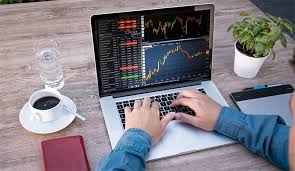Understanding Forex Trading Accounts A Comprehensive Guide 1496873204

Understanding Forex Trading Accounts: A Comprehensive Guide
Forex trading accounts are essential for anyone looking to engage in currency trading. They serve as the platform where traders can perform transactions, access market information, and manage their trading strategies. As someone interested in trading, understanding the different types of accounts and how to choose the right one is critical for success in the Forex market. For a detailed list of forex trading account Trading Brokers, consider browsing comprehensive reviews and comparisons to select the best provider for your needs.
What is a Forex Trading Account?
A Forex trading account is an agreement between a trader and a broker through which the trader can buy, sell, and hold different currency pairs. Forex accounts come with various tools and features, which help traders analyze market trends, manage their investments, and execute trades. Understanding the mechanics of a trading account is fundamental for anyone hoping to develop a successful trading career.
Types of Forex Trading Accounts
There are several types of Forex trading accounts available, and choosing the right one depends on your trading style, experience, and capital. Here is a breakdown of the common types of Forex trading accounts:
1. Demo Accounts
Demo accounts are a great starting point for novice traders. They allow you to practice trading with virtual money, giving you the chance to explore the trading platform without risking real capital. This type of account helps you understand how to use trading tools, measure your strategies, and familiarize yourself with the market before moving on to trading with real money.
2. Standard Accounts
Standard accounts are the most common type of account used by traders. They usually require a higher minimum deposit and allow for significant trading volume. In a standard account, each pip (price change) is worth $10 per lot traded. This account type is suitable for experienced traders who are comfortable managing larger risks.
3. Mini Accounts
Mini accounts are designed for those with lower capital. They require a smaller minimum deposit and allow you to trade with smaller lot sizes, where each pip is worth $1. This account type is perfect for beginner traders who wish to gain real market experience without risking large amounts of capital.
4. Micro Accounts
Micro accounts further lower the barrier to entry for new traders. They typically require very little capital and allow for trading in micro-lots, where each pip is worth $0.10. This account type is ideal for those who want to dip their toes into Forex trading without a significant financial commitment.
5. ECN Accounts
ECN (Electronic Communication Network) accounts are designed for more professional traders who seek to trade directly with other market participants. This type of account provides access to lower spreads and allows for quicker order execution, but it often comes with a commission. ECN accounts are recommended for experienced traders who rely on high-frequency trading strategies.
How to Open a Forex Trading Account
Opening a Forex trading account is a straightforward process, but it requires careful consideration to ensure you select the best broker for your needs. Here are the steps to open a Forex trading account:
1. Research and Select a Broker
The first step in opening a Forex trading account is to conduct thorough research to find a reputable broker. Look for reviews, regulatory compliance, available trading platforms, spreads, and the types of accounts offered.
2. Register Online
Once you have selected a broker, you will need to visit their website and fill out a registration form. This usually entails providing personal information such as your name, address, date of birth, and contact information.

3. Verify Your Identity
To comply with regulatory requirements, brokers will ask for identification documents. This may include a government-issued ID along with a proof of address, such as a utility bill or bank statement.
4. Make Your Initial Deposit
After your account is verified, you will be required to make an initial deposit. The minimum deposit varies depending on the broker and the type of account you have chosen.
5. Download Trading Software
Most Forex brokers provide downloadable trading platforms. Popular platforms include MetaTrader 4 (MT4) and MetaTrader 5 (MT5). Download the software, install it, and log in using your account credentials.
6. Start Trading
After completing the above steps, you can begin trading. Whether using a demo or live account, it’s essential to develop a trading plan and adhere to it to ensure success in the Forex market.
Considerations When Choosing a Forex Trading Account
When selecting a Forex trading account, several factors should be taken into account to ensure you make an informed decision:
1. Regulation
Choose a broker that is regulated by a reputable authority. This ensures the broker follows strict guidelines and operates in a transparent manner.
2. Trading Platform
Ensure the trading platform is user-friendly and compatible with the tools you need to trade effectively. The platform should also provide access to real-time data and a wide range of trading instruments.
3. Fees and Spreads
Understand the fee structure of the broker, including spreads, commissions, and any other fees that may apply. This knowledge will help you better manage your trading costs and improve profitability.
4. Customer Support
Strong customer support can significantly enhance your trading experience. Ensure the broker offers responsive assistance through multiple channels, such as chat, email, and phone.
5. Educational Resources
For beginner traders, educational resources such as webinars, tutorials, and market analysis can be invaluable. Look for brokers that offer extensive educational materials to support your learning.
Conclusion
Forex trading accounts are the gateway to engaging in currency markets, and understanding the various types of accounts available is crucial for traders. By considering factors such as regulation, fees, and available resources, you can choose an account that meets your needs and enhances your trading journey. Ultimately, success in Forex trading will depend on your commitment to learning, developing effective strategies, and making informed decisions.
Now that you are equipped with knowledge about Forex trading accounts, you can confidently take your first steps into the world of Forex trading.

Leave a Reply
Want to join the discussion?Feel free to contribute!